- Home
- JoAnn Ross
Castaway Cove Page 23
Castaway Cove Read online
Page 23
“Pops just tried to beat up an orderly who was helping Analise get him into his uniform.”
38
“I’ve got to get over there,” he said. “From what Analise said, he got confused when he saw the uniform and thought they were trying to force him to go back to war. Which was when he began flailing away.
“So, it looks as if he’ll miss Ollie’s memorial service. And what the hell will we do if this gets him kicked out of Still Waters?”
“I don’t think that happens unless fighting becomes habitual,” Annie assured him. “Agitation is common with Alzheimer’s patients, and outbursts of aggression aren’t unknown as the disease progresses. Just last month I arrived there in time to see two elderly ladies rolling around on the floor wrestling over frosting tubes during Sedona’s cookie-decorating class.”
“And who knows if they’re still living there?” he pointed out. “Would you mind staying until I get back?”
“I’d already agreed to sit with Emma while you and Charlie were at the memorial,” she reminded him. “But I really think you ought to give me a shot at getting him calmed down.”
“I’m his grandson.”
“True. And family means a lot. But I still think I’m a better choice.”
“What makes you think you’d be any better at settling him down than Analise, who’s trained to handle dementia patients?” he asked as he headed toward the front door.
She didn’t take offense at his less-than-encouraging tone. Although it wasn’t yet noon, he’d already had what Emma had described as a terrible, horrible, no good, very bad day.
“I’ve been working on his war scrapbook with him for weeks. He’s told me a lot of stories, especially about the day his carrier got hit by Japanese bombs and Ollie pulled him out of the ocean before it sank.”
“Damn. How could I not know any of that? All he ever said was that he served in the Pacific with Ollie.”
When he dragged his hand through his hair again, Annie caught it on the way down and held it for a moment in both of hers. “It’s probably easier to speak with a stranger. Or,” she said, “I’m certainly no expert, but I’ve come to realize that there’s often no rhyme or reason when it comes to Alzheimer’s.
“Maybe I just happened to be there the day his memories had spun him back in time and he felt like talking. Then, perhaps once he started, it became easier to keep going.”
Something occurred to her. “Did they give him any drugs to calm him down?”
“No. They managed to get him into the sensory room without any. That’s a good sign, right?”
The sensory room, designed for when residents became agitated or had difficulty sleeping, which was common with dementia patients, was a dimly lit room with a dark-painted ceiling lit with stars.
A machine provided soothing sounds: white noise, rain, the surf, or a waterfall, which Annie knew Charlie liked best because it reminded him of the waterfall at Rainbow Lake where he and his Annie had honeymooned.
There was also a blanket—scented with lavender from Maddy’s grandmother’s Lavender Hill Farm—that could be warmed; a daybed, which the women tended to prefer; and a big vibrating recliner.
The room had been designed by experts in the psychology of dementia, and usually it took only eight to ten minutes to calm a resident.
“A very good sign,” Annie confirmed. “And my point was that because I know all the history between Ollie and him, there’s a chance that I can help him remember that it’s in the past. Because if he later realizes that his actions caused him to miss the memorial, he could be really upset.”
“He was afraid, when I told him about Ollie dying, that he might have forgotten it,” Mac told her. “He said they’d been through so much it would’ve been wrong to forget. If you wouldn’t mind—”
“Of course I wouldn’t. I can’t guarantee success, but I’ll do my best.”
She thought she saw him relax. Just a bit. “Thanks. I owe you.”
She smiled at that. “Friends,” she reminded him. Then went up on her toes and kissed his cheek.
Despite the seriousness of the situation, he hooked one arm around her waist, drew her up against him, and kissed her. Long and hard and so deep that, feeling as if she was drowning, she grabbed hold of his shoulders for a lifeline.
“This is insane,” she said as she pulled away and retrieved her purse, which she’d tossed onto the entry table with the bag of scrapbook goodies when she’d arrived. “Crazy . . . I can’t believe with all that’s going on right now, as inappropriate as that kiss was at this time, dammit, I want more.”
“Don’t feel like the Lone Ranger.” His voice was deep and bedroom-husky. Which had her mind following her rebellious body to places she had no business thinking about. Certainly not now. Maybe never.
As if to prove his point, he caught her arm and swung her around again for one more quick, hot kiss that sent her head spinning and made her knees weak and had her fluttering in parts of her body that Annie had forgotten even could flutter.
“I don’t know what you had planned for lunch today,” he said. “But I do know that we’re not finished, Sandy from Shelter Bay. Not by a long shot.”
“I’ve got to run.”
And run she did, out to the car, then waited until she was out of sight around the corner before she pulled over to the curb. Needing a moment to regroup, she took a few of the long, deep yoga breaths Sedona had taught them all.
Although Charlie and Emma’s accident had complicated their situation, Annie was really going to do it.
She was so going to do Midnight Mac.
“But first,” she said to herself, pulling back onto the deserted residential street, “I have to bail Charlie out of Time Out.”
39
Charlie was back in his room, clad in white boxer shorts, white socks, and a white T-shirt when Annie arrived. She was relieved that he was calm, but the fact that he wasn’t dressed and was sitting in his recliner with his arms stubbornly folded over his chest wasn’t a good sign.
“Hi,” she said with a warm, but not overly cheerful smile. One thing she’d discovered was that when someone was depressed, having another person invade his or her personal space by being overly perky not only didn’t help, but could actually make things worse.
He looked up at her.
“Who the hell are you?”
Annie pulled a chair up beside him and sat down so he wouldn’t have to look up at her. “I’m a friend. Annie Shepherd. You and I make scrapbooks together sometimes.”
“The hell I do. Scrapbooks are girlie things. My Annie makes scrapbooks.” He gave her a long look. “You’re pretty enough,” he allowed. “But my Annie looks like a pinup girl.”
“I know.”
His brow furrowed. “You know my sweetheart?”
“Only by the pictures you’ve shared,” she said, taking the family album from the side table and opening it to the wedding photo. “This is one of my favorites.”
He stared at it for a long time. Annie realized that having been lost for a while in the confusing labyrinth of memories, he was having trouble figuring out what Annie was doing in her postwar wedding dress while they were trying to return him to war.
“She made that dress herself,” Annie reminded him.
He nodded as a spark of comprehension dawned in his eyes. “From parachute silk.”
“Silk you sent her home during the war,” Annie said gently. “World War II.”
“I know which damn war it is,” he snapped. Then stopped. Looked down at the photo again. Then out toward the garden, where red, white, and blue petunias had been planted for the upcoming holiday.
“Which war it was?” he said tentatively. It broke her heart watching him struggle to pull himself back from those mists of time.
Annie had been working on living in the moment.
She couldn’t imagine the difficulty of trying to live in the moment when your mind had become like the shifting sands on the beach.
Another thing occurred to her as Charlie slowly turned the pages, taking in the photos she’d helped him put together. She’d only known Charlie Buchanan a few months. Mac had known him as being that strong, hardy, tale-telling grandfather for decades. How difficult must it be for him to watch the unraveling of a life? A life they’d made together after he’d already lost his father at too young an age? What helplessness and yes, at times, like today, what hopelessness he must be feeling.
When that idea proved too depressing, she turned her mind back to the project at hand.
“That veil is mosquito netting,” she reminded him as he stared at a photo of the young and happy couple cutting a tiered white wedding cake. Charlie’s now age-spotted hand was still young and strong atop his bride’s on the knife.
“I brought that netting home for her,” he said, more to himself than to Annie. “From the Pacific.”
“It was very clever of you to think of it. And she looks beautiful in it.”
“I wanted to get married as soon as my ship docked in San Francisco,” he said. “But she made me wait because she said she’d already waited so long, a few more months wouldn’t hurt to do it up right.”
He ran an aged finger, bent and broken from various tangles with ropes and traps as a fisherman, over the faded black-and-white photo. “After all I’d put her through, worrying about me, especially after I nearly drowned at sea, there was no way I wasn’t going to give her anything she wanted.”
He lifted his eyes, which were wet with tears, up to Annie’s.
“Ollie Nelson pulled me out of the water. Up onto the deck of the Minneapolis. Nearly fell into the drink himself doin’ it. That’s how we met.”
“Yes,” Annie said as her own eyes filled.
“He saved my life. And became my best friend.” He looked down at another photo of the small wedding party consisting of bride, groom, and two attendants. “And my best man.”
“He was a friend for many years,” Annie agreed softly.
“Was.” The word lingered between them as he processed that idea. “And now he’s gone,” he said finally. “And I’m the last one left.”
She could only nod.
He sighed. A long sigh filled with reluctant acceptance and deep regret.
Then, with effort, Charlie pushed himself out of the recliner. “We’d best get going,” he said. “I’ve got a memorial to go to.”
40
Fortunately, although the largest room at Genarro’s funeral home was filled to capacity with fellow veterans, the service didn’t last long. Before driving Charlie by the house, so Mac could take over, Annie had called and given him a short version of how she’d gotten him back on track. Knowing how intransigent his grandfather could be, Mac suspected it couldn’t have been easy, and now not only did he still want her, but he had even more reason to be grateful to her.
He had every intention of crossing that line between friends and lovers, but at this point Mac realized that what they’d begun to build between them was more than just friends with benefits.
Something deeper.
Something he was going to have to consider for both their sakes. Because while the chemistry between them was more powerful than he’d ever felt, he’d also learned the hard way that maintaining a relationship was difficult enough even before adding in the complexity of being a single father.
He no longer had just himself to think about. He’d screwed up so much about parenting, he didn’t want to mess up his daughter.
Although he’d realized that Annie had a point about wanting to be careful about not hurting Emma, having watched them together today, he realized that he was going to have to balance all the different relationships in his life carefully. Since he was used to being a just-go-for-it kind of guy, that wasn’t exactly his long suit.
“You okay?” he asked Charlie as they left the service. Because of the way the day had started out, and because Mac was concerned about how his grandfather was doing, he was relieved when Charlie decided to skip the interment and the supper planned for afterward at Bon Temps.
“After getting through the war alive, I’ve always figured any day I’m aboveground is a good day.”
“Got a point there,” Mac agreed.
The older man didn’t say anything on the drive back to the memory care residence. Which was just as well, since Mac didn’t want him talking about anything that might cause battle flashbacks while he was in the truck.
It was only after Charlie was settled into his room that he said, “Did I ever tell you about how I met Ollie?”
“During the war,” Mac replied, even though now, thanks to Annie, he knew more.
“I was on the Lexington. It was a carrier based out of Pearl. But we missed the attack because we’d been sent out on December fifth, two days earlier, to ferry some Marine dive-bombers out to reinforce Midway Island.”
“Lucky,” Mac said. Sensing a story coming, one he’d been hoping to hear, he pulled up a chair.
“Yeah. It all didn’t seem real when we were called back to Pearl and saw the destruction. My first thought was relief we hadn’t been there. Then I felt guilty for feeling that way. Finally, I just settled on being goddamn mad.”
Which was smart, Mac thought. Since his pops still had a lot of war to get through and being dragged down with survivor guilt wouldn’t have helped anyone.
“I had two friends on the Arizona,” he said. “Jerry Long and Pete Novak. We’d met at the enlisted men’s club and I’ve gotta admit I was real pissed when we got our orders to leave on the fifth, because there was going to be a big Battle of the Bands at the club on the next night.
“Jerry and Pete kept ragging me about all the pretty girls I wasn’t going to get to dance with, not that I would’ve danced with any of them, because it would’ve seemed like cheating on Annie, but it would’ve been fun to have some beers and listen to the bands.”
His gaze turned a little distant. “But I never saw either one of them again because they went down with their ship.”
“You never mentioned that when you took me to the memorial on that trip to Hawaii.”
Charlie shrugged. “Why talk about something you can’t change?”
Or why talk about something that still hurt? Mac wondered if the increasing loss of time delineation between past and present might cause ancient survivor guilt to rise up again. Which could cause depression.
Another thing he was going to have to ask Analise to watch out for.
“Look in the bottom drawer of that dresser,” Charlie instructed him. “The album’s under some sweaters. It’s the blue one.”
Mac found it easily. It was, appropriately, navy blue, with The United States Navy in raised gold letters and the round Navy seal showing a bald eagle with spread wings perched on an anchor in the center.
Obviously more of Annie’s work.
The first page showed the same photos that were on the board outside the door. Charlie in his recruitment photo, and another in his work dungarees on board.
Then the images changed as fast as life must have changed for Seaman First Class Charles Boyd Buchanan.
“This is the Lexington.” He tapped a finger on a faded old newspaper photo of an aircraft carrier, its deck filled with planes. “My flattop . . . We sure saw our share of action over the next months.” Although his tone was matter-of-fact enough, Mac figured his words were probably a major understatement.
Beneath the photo someone had listed the various battles the carrier had taken part in. “That Annie Shepherd looked those up online and wrote them all down,” he said, confirming what Mac had guessed.
His pops turned the page. “And this is her during the Battle of the Coral Sea. May ’forty-two.”
; The carrier was engulfed in a cloud of billowing black smoke and she was listing dangerously. Although the paper had yellowed and cracked with age, Mac could see sailors diving off the deck.
“She’d been hit with some bombs, which caused a bunch of fires and explosions, but the crews were able to get all the fires out and we managed to keep refueling and sending planes up,” he said.
“But finally there were just too many explosions, so the captain gave us the abandon-ship order. At that point, though I was always scared spitless of sharks, going in the water was preferable to staying on board.
“So, there we all were, two thousand plus, sliding down the monkey lines, but the problem was that when you got to the last twenty feet, there were no more knots on the rope, so you’re trying like hell to hang on, but it’s wet and you’re sliding into the guy in front of you, and the guy above you is sliding into you and the rope eats up your hands something goddamn awful.”
He held out his hands, palms up, revealing faint white scars that Mac had never before noticed, given how dinged up his grandfather’s hands were from years of commercial fishing. It crossed his mind how they both carried physical reminders of their individual wars.
“Finally, I just said a real quick version of the Hail Mary and leaped into the water. The flattop was creating some heavy swells in an already rough sea while going down, which had me worried for a while she was going to tip over on me. But then I was pushed a long ways from the ship and from what I could see, I was all alone, which I’ll have to admit didn’t give me a whole lot of confidence about making it out of the water alive.”
“I can imagine.” Actually, Mac couldn’t. At least he’d been mostly unconscious during his much shorter battle experience.
Charlie’s eyes took on that soft, unfocused look that suggested he wasn’t seeing the scrapbook, or the room, or the red, white, and blue garden outside the window, but miles of smoke-engulfed sea with oil and gasoline and God knows what else floating on it. Bodies? Likely, given what Charlie had said about the fires and explosions.

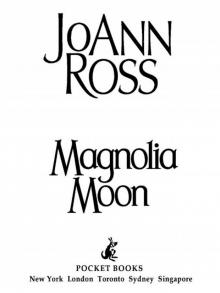 Magnolia Moon
Magnolia Moon Summer on Mirror Lake
Summer on Mirror Lake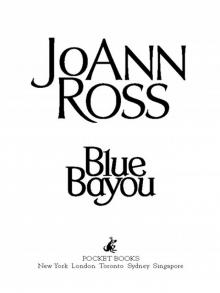 Blue Bayou
Blue Bayou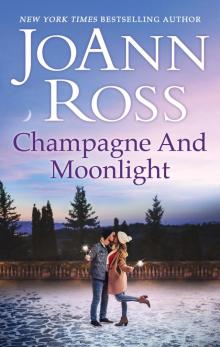 Champagne and Moonlight
Champagne and Moonlight No Regrets
No Regrets Long Road Home
Long Road Home Southern Comforts
Southern Comforts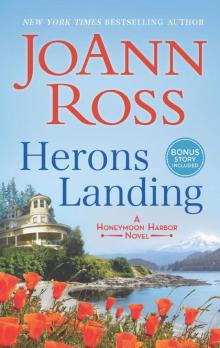 Herons Landing
Herons Landing Untamed
Untamed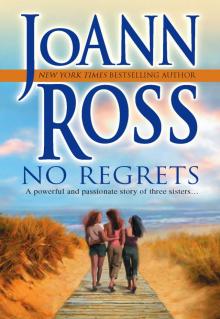 No Regrets (Mira Romance)
No Regrets (Mira Romance)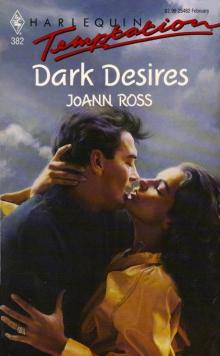 Dark Desires
Dark Desires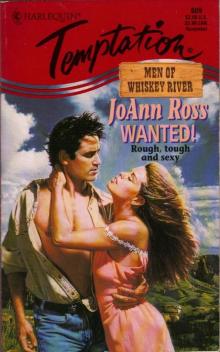 Wanted!
Wanted! River Road
River Road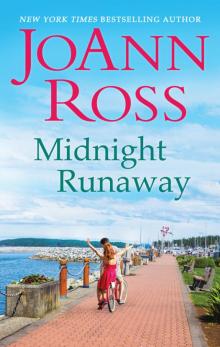 Midnight Runaway
Midnight Runaway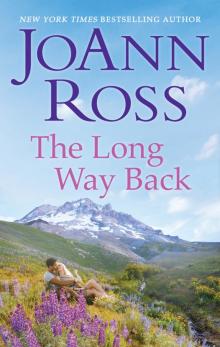 The Long Way Back
The Long Way Back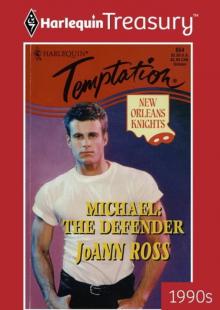 Michael: The Defender
Michael: The Defender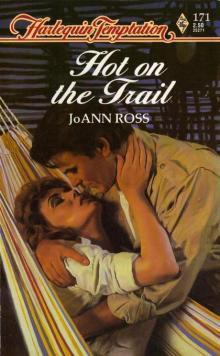 Hot on the Trail
Hot on the Trail When I'm With You
When I'm With You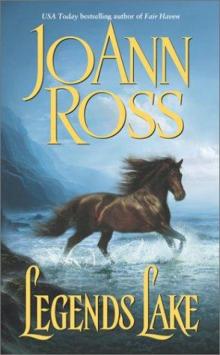 Legends Lake
Legends Lake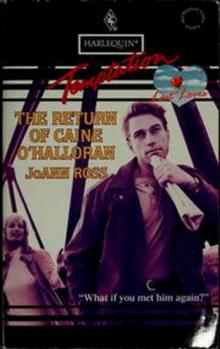 The Return of Caine O'Halloran
The Return of Caine O'Halloran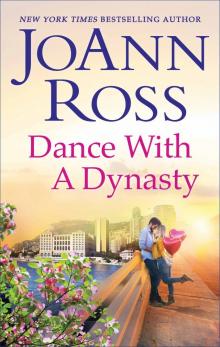 Dance with a Dynasty
Dance with a Dynasty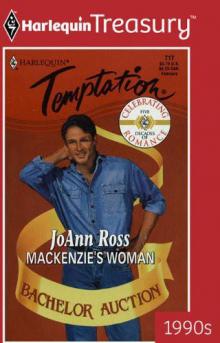 MacKenzie's Woman
MacKenzie's Woman Impulse
Impulse Sunset Point: A Shelter Bay Novel
Sunset Point: A Shelter Bay Novel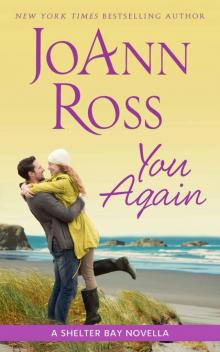 You Again: A Shelter Bay novella (Shelter Bay series Book 8)
You Again: A Shelter Bay novella (Shelter Bay series Book 8)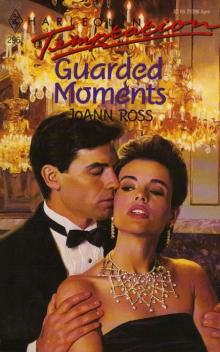 Guarded Moments
Guarded Moments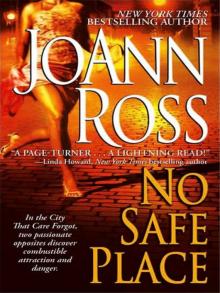 No Safe Place
No Safe Place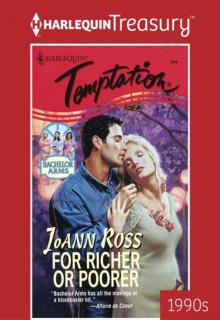 For Richer or Poorer
For Richer or Poorer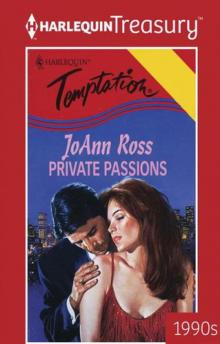 Private Passions
Private Passions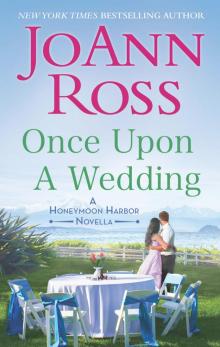 Once Upon a Wedding
Once Upon a Wedding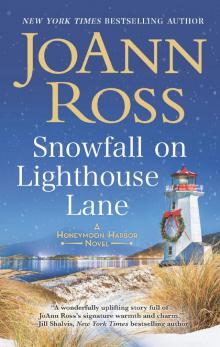 Snowfall on Lighthouse Lane
Snowfall on Lighthouse Lane Christmas on Main Street
Christmas on Main Street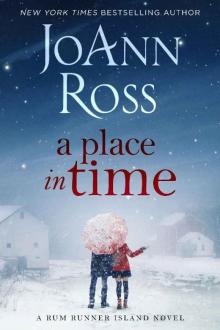 A Place in Time (Rum Runner Island Book 1)
A Place in Time (Rum Runner Island Book 1)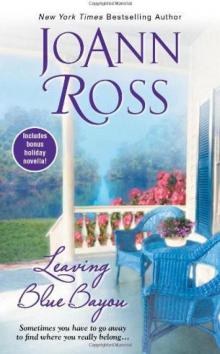 Leaving Blue Bayou
Leaving Blue Bayou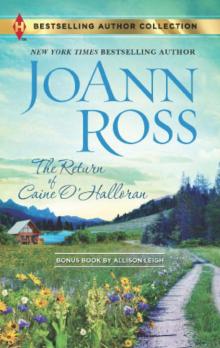 The Return of Caine O'Halloran: Hard Choices
The Return of Caine O'Halloran: Hard Choices Lucky in Love
Lucky in Love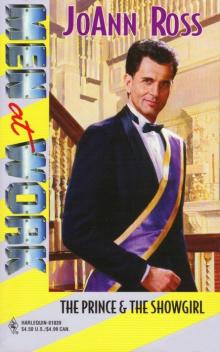 The Prince & The Showgirl
The Prince & The Showgirl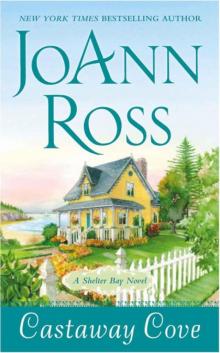 Castaway Cove
Castaway Cove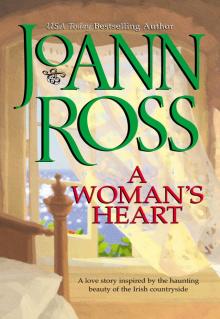 A Woman's Heart
A Woman's Heart One Summer
One Summer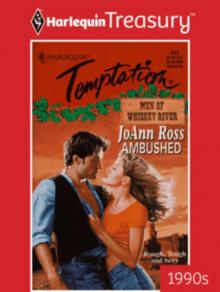 Ambushed
Ambushed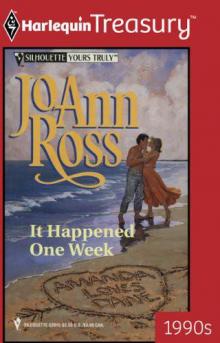 It Happened One Week
It Happened One Week Home by the Sea
Home by the Sea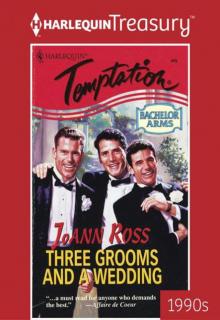 Three Grooms and a Wedding
Three Grooms and a Wedding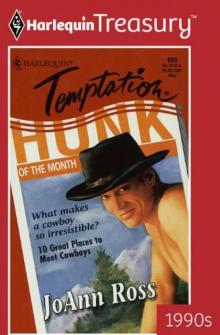 Hunk of the Month
Hunk of the Month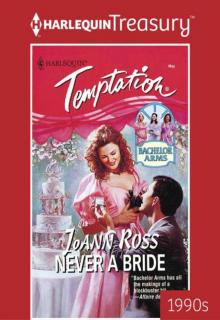 Never a Bride
Never a Bride Sun Kissed
Sun Kissed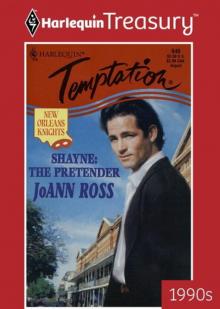 Shayne: The Pretender
Shayne: The Pretender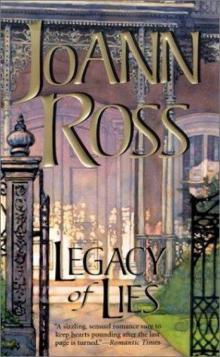 Legacy of Lies
Legacy of Lies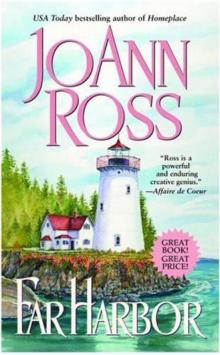 Far Harbor
Far Harbor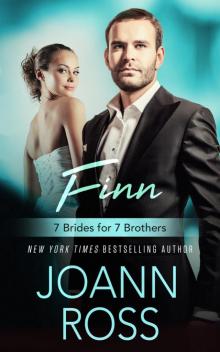 Finn
Finn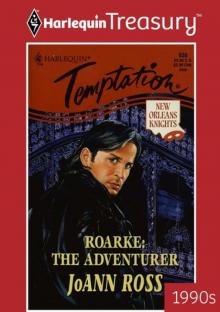 Roarke: The Adventurer
Roarke: The Adventurer I Do, I Do...For Now (Harlequin Love and Laugher)
I Do, I Do...For Now (Harlequin Love and Laugher) Briarwood Cottage
Briarwood Cottage On Lavender Lane
On Lavender Lane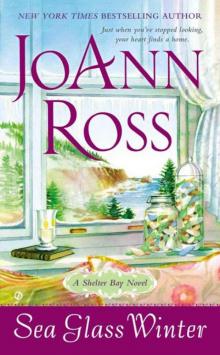 Sea Glass Winter
Sea Glass Winter River's Bend
River's Bend Christmas in Shelter Bay
Christmas in Shelter Bay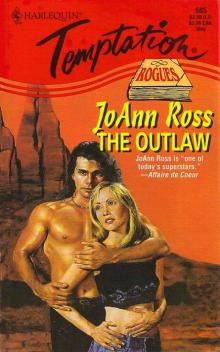 The Outlaw
The Outlaw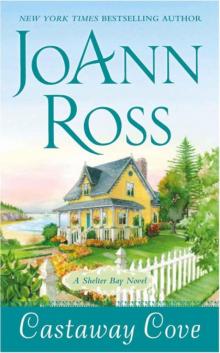 Castaway Cove (2013)
Castaway Cove (2013) Confessions
Confessions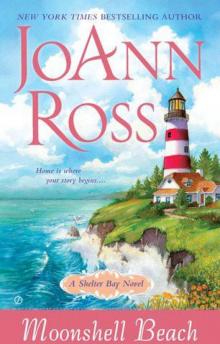 Moonshell Beach: A Shelter Bay Novel
Moonshell Beach: A Shelter Bay Novel